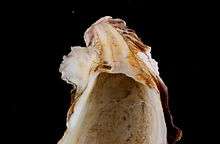Resilifer

Hinge area in one valve of an oyster shell (Ostreidae), showing the groove that is the resilifer
A resilifer is a part of the shell of certain bivalve mollusks. It is either a recess (a pit or groove of some sort) or a process, the function of which is the attachment of an internal ligament, which holds the two valves together.
An internal ligament (which requires a resilifer to function) is part of the hinge mechanism in certain taxonomic families of bivalve shells, such as oysters and scallops.[1][2][3] A resilifer (and its associated ligament) is the primary structure comprising the type of bivalve hinge that is known as an "isodont" hinge.

The hinge area in one valve of a scallop shell (Pectinidae), showing the internal ligament still positioned in the resilifer
References
- ↑ http://paleo.cortland.edu/tutorial/Bivalves/bivalvemorph.htm
- ↑ Bivalves by J.H. Leal, Bailey-Matthews Shell Museum, Florida, USA http://www.shellmuseum.org/BivalvesLeal.pdf
- ↑ Invertebrate Paleobiology on-line syllabus on Bivalves, by Dr. Burt Carter, Georgia Southwestern State University, at: http://itc.gsw.edu/faculty/bcarter/paleo/labs/moll/biv2.htm
| ||||||||||||||||||
This article is issued from Wikipedia - version of the 10/21/2014. The text is available under the Creative Commons Attribution/Share Alike but additional terms may apply for the media files.